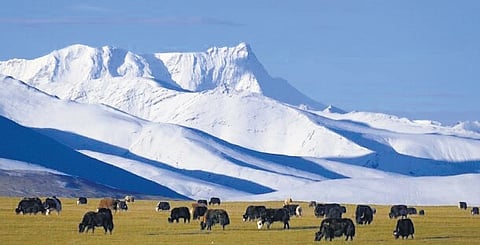

American poet, musician and multi-genre artist Scott Ezell opens his travelogue, Journey to the End of the Empire: In China Along the Edge of Tibet, with a memory dating back to 1995. Travelling in Ladakh, he first experienced Tibet: “The earth unfurled like hammered gold, snow-capped mountains rose in the distance. Rivers churned mud- and copper-coloured between banks lined with almond trees and barley fields, and the sky was a luminous jewel pressing down from above…”
Nine years later, in 2004, Ezell ventured once again into Tibet. This time, he began in southwest China and worked his way north. Over six weeks, travelling by local bus, by hitchhiking, and part of the way on a motorcycle, Ezell went all the way to Kekexili (Hoh Xil, in the north-eastern part of the Qinghai-Tibet Plateau), covering some 1,930 km.
Subsequently, over the next 15 years, he travelled to Tibet repeatedly, witnessing the rapid and horrifying changes he had only begun to see in that first trip to the world’s highest plateau. Those changes, and how they have affected Tibet and Tibetans, impacted his memory of that first trip, and the narrative that emerged out of the combination of these—of the changing face of Tibet over more than a decade—forms the backbone of this book.
Journey to the End of the Empire is divided into three parts: Obelisks; Remembering the Forgetting World (On a Motorcycle in Tibet); and Ghost Landscapes. It begins in the city of Dali in Yunnan, where Ezell first sees an intriguing graffiti: ‘They’re going to cant and bevel you’, a slogan being frantically scrubbed away by a work crew. He wonders what this enigmatic phrase might mean, and comes to know soon enough—it is a whisper of rebellion against the ‘empire’ (as he dubs China), against the might of an administration that seeks to obliterate the ‘subversive’.
This is a realisation that comes through again and again as Ezell travels through Tibet; as he comes into contact with everybody from lamas to school teachers, restaurant owners to nomads, petty bureaucrats, hotel workers. It comes forth in the landscape he wanders through. Soaring mountains and intimidatingly harsh desertscapes, yes; but also glittering skyscrapers of steel and glass that soar high into the sky; dams that hold in rivers and inundate settlements; highways and railways that cut through the land.
People robbed of not just their livelihood, but also of their very identity. Ezell’s conversations—many fleeting—show the different sides of Tibetans caught under the trampling of the Chinese government. There are those who yearn to escape, to make their way to the fabled land of opportunity, America. Others, struggling to somehow survive. What comes through, however, repeatedly, is the warm-heartedness, generosity and kindness of the average Tibetan: in many instances, Ezell is given food, shelter, and a kind word—in exchange for nothing more than an ear that listens and a heart that understands.
Journey to the End of the Empire is a mix of travelogue, poetry (often even prose poetry), and socio-political and economic commentary. While a hard-hitting look at the tragedy that is China’s treatment of Tibet, it also ends up being a metaphor for industrial societies everywhere: for the greed that propels people not just here, but across the world
to squeeze every last bit out of a land, to ravage and plunder until nothing remains. Ezell speaks out against the frightening decimation of the ecosystem, against the suppression of heterogeneity and diversity, against the large-scale ‘canting and bevelling’ of all that does not agree with the powers that be.
While it is a paean to Tibet, the book is, all said and done, more too. It is, in its way, an act of subversion, a song for freedom and for the right to live as one would wish.
A tribute to indigenous ways of life, to living in harmony with the land.
Journey to the End of the Empire: In China Along the Edge of Tibet
By: Scott Ezell
Publisher: Speaking Tiger
Pages: 284 Price: Rs 499